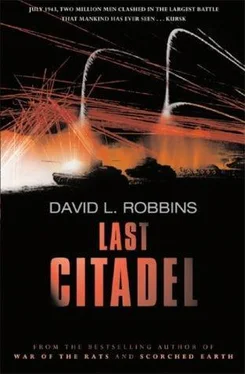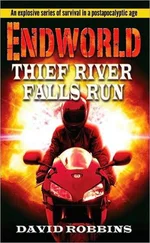Thoma’s blood.
Luis did not hesitate. Thoma was off the board. He wrapped his fist around the smirched handle and pulled the heavy door down. He’ll take Thoma’s blood back into battle for him, gain some measure of revenge for the man. This felt right. Luis sat alone inside the Tiger, with the mechanics pounding at its side.
As he expected, the Tiger was far roomier than the last tank he’d sat in, the Mark IV His commander’s seat was secured above the massive breech of the main gun. He set his feet on the turntable and could almost stand erect. Inside the cupola, his head was ringed by five thick glass vision blocks, each with a padded browrest. He leaned into them one at a time and peered into the tent, forward, to the sides, and back. There was his crew, in their tight little chorus line, still black-clad and disciplined. This added to his delight.
Below Luis’s feet were two more chairs. Directly in front and to the left was the gunner’s position, with all its firing controls and sighting and aiming systems. This was one of the great advantages of the Tiger, for German optics were the finest in the world. The gunner was expected to hit a stationary target inside twelve hundred meters with his first round, at two thousand meters with his fourth round, and a moving target under twelve hundred meters with his third round, each shell aimed and fired within thirty seconds. The gunner had at his disposal a hydraulic turret traverse and a handwheel for the final few degrees of accuracy. The commander’s position had only a manual traverse flywheel in case the hydraulics failed, but no access to the power traverse control. The designers made it plain that operating the cannon was the gunner’s job.
Below the gunner sat the driver. Luis craned himself lower to see into the driver’s position. The main features there were the steering wheel and poor visibility. The driver was only allowed to see the outside world through a narrow glass block visor and a periscope. No provision had been made for him to drive with his head out of the chassis. At the driver’s feet were conventional pedals for brake and clutch. To the right, across the bulk of the transmission and a shelf for the tank’s radio, was the position for the bow gunner/radioman. The bow gunner had a 7.92 mm machine-gun and a telescope firing sight. The odd thing here was a metal headpan, an upside-down cup at the end of a rod designed to rest on the bow gunner’s skull, so that he moved the direction of the muzzle with his head. When the bow gunner was not firing, the radio to his left was his priority.
Luis straightened his back and sat up in his commander’s seat. Beside him, on the right-hand side of the big breech, was the loader’s position. This chair faced the rear of the turret. The loader had the most room of any of the five-man crew, with superb access to the many rounds of the tank’s ammunition. The shells were mounted on horizontal wall racks in the compartment, five dozen rounds within easy reach. There would be more in bins beneath the floor. The rounds were huge, the sharp teeth of this Tiger, bigger than anything the Russians could hurl back at him. Luis tried to take one in his arms and almost dropped it out of the rack. He put it back gingerly, a little embarrassed, he’d almost fumbled it and let the crew hear him knocking around inside their tank. It appeared the Tiger had been reloaded, with a full complement of rounds divided equally between AP and high-explosive.
He leaned into the forward vision block, to stare along the magnificent length of the 88 mm gun. He relaxed in his chair, just for one more private minute, and breathed in the cave of the Tiger’s innards. He liked the arrangement in here; unlike the Mark III and the Russian T-34 where the commanders were also gunners, every crewman in the Tiger – like the older Mark IVs, with a five-man crew – had a well-defined task. The radio, all guns, the driving, each had its station. The commander had only to command. Luis, even without experience in a Mark VI, knew he could do that. He’d led tanks in battle many times. Command was his nature, and as soon as the mechanics repaired the wheel, it would be a nature unbound. He’d never had this kind of force at his fingertips – not in another tank, not in the corrida holding his banderillas over his head, not even in his fast knife hand. He caressed the Tiger’s thick hide from the inside, where he and his men would be the Tiger’s courage and anger. The partisan’s heartbeat still throbbed in his hand, but different now, encased in steel.
He drew a deep breath and put his hand to the bloody hatch cover. He shoved Thoma out of the way and stood in the commander’s cupola. The four crewmen below had not moved. He glanced down at the mechanics, they’d gotten off the bad wheel. The Tiger would be rolling inside the hour.
Luis climbed down and stood in front of Sergeant Balthasar.
‘I’m sorry about Captain Thoma. I knew him only a little. But he must have been a fine commander to bring you through like this.’
Luis expected this sentiment would dispose of Thoma and finalize his taking of the Tiger and crew. Balthasar said, ‘Yes, sir.’ The others made memorial faces. Luis changed his tone.
‘Now, Sergeant. We’ll leave for Sukho-Solotino as soon as possible. Which is the driver?’
‘I am, sir.’
A teenager with a big gap in his front teeth spoke, a corporal. He lisped his name and Luis did not remember it a second after it was said.
‘Make certain she’s properly fueled. Any problems with the transmission, the engine, anything the mechanics should look at while we’re here?’
‘No, sir.’
‘I’ll rely on that.’ Luis dripped a hint of threat into this remark. ‘Radioman?’
Another of the four straightened. Luis asked again if all was well. He repeated this query with the loader, Are we fully armed, machine-guns and main battery? Luis listened to perfunctory replies, marking each man in his head by role and not by name or rank. Driver. Loader. Gunner. Radio. There was no need for them to be men. They were tasks.
‘Gunner,’ he said to Balthasar. ‘Walk with me.’
Luis led the young man away from the tent. The sun climbed in the morning but it was not yet even eight o’clock. Luis spoke.
‘The crew,’ Luis said. ‘Tell me right now anything I need to know.’
‘They’re the best, Captain. Every one of them.’
‘Again, I’ll rely on that.’ Again the threat on the pallid lips. ‘You understand.’
The sergeant took this in. Luis saw and savored the impact.
‘Yes, sir.’
‘The rest of the regiment is in Sukho-Solotino. What’s the condition of the other tanks?’
‘We’re down to thirty-one Mark IIIs, thirteen Mark IVs, and seven T-34s.’
‘What about the other Tigers?’
The sergeant hesitated.
‘You don’t know, sir?’
Luis was aware only of what the map and messages had told him, the progress and location of wooden block armies.
‘Know what?’
‘We’re the last Tiger.’
‘In the company?’
‘No, sir.’
The gunner drew himself up, like a schoolboy ready for punishment. ‘In the division.’
Luis went stock-still, to keep from the gunner how this rocked him. He was about to join an armored division that four days ago had thirteen Tigers. Seconds stretched out while he stared at the sergeant. The wreckage of a dozen Mark Vis, invincible machines, would not play out in his head. Something was wrong. Luis couldn’t believe it was the Tigers themselves but the hands that guided them, into minefields, into ambushes, into indefensible positions. Yes, the Tigers were slow, and certainly there were mechanical problems cropping up here and there. But to lose all but one to the Russians in four days? No. Luis could not blame the machines.
Читать дальше












